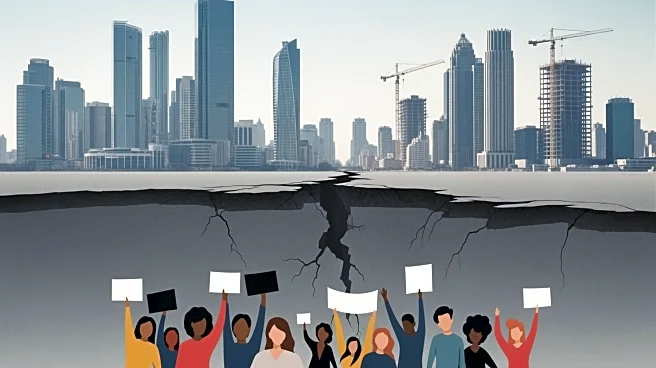What's Happening?
Residents in Istanbul's Kadıköy district are protesting against a plan to convert one of the city's last disaster assembly zones into a luxury housing complex. The site, located in the historic Caferağa
neighborhood, includes essential facilities such as football fields, a family health center, and disaster coordination stations. The Istanbul Regional Directorate of Foundations recently listed the 12,000-square-meter area for auction, sparking outrage among locals and environmental activists. They argue that the redevelopment would eliminate crucial green space and remove one of the few safe gathering areas for emergencies. The protest highlights growing concerns over Istanbul's earthquake preparedness, as the city sits on the North Anatolian Fault and faces a high risk of a devastating quake. Many of the open-air refuge zones established after the 1999 İzmit earthquake have been built over, leaving only a fraction of the original assembly areas meeting safety standards.
Why It's Important?
The controversy underscores a critical tension between urban development and disaster readiness, a pattern observed in major cities worldwide. As Istanbul continues to expand, the need to preserve public spaces for emergency preparedness becomes increasingly urgent. The decision to auction off the disaster assembly zone has drawn criticism from local civic groups and officials, including Kadıköy Mayor Mesut Kösedağı, who argues that tenders should not proceed in conservation zones without proper zoning plans. The situation reflects broader challenges faced by cities balancing economic growth with public safety, especially in regions vulnerable to natural disasters. The outcome of this protest could influence future urban planning decisions and highlight the importance of integrating disaster preparedness into development projects.
What's Next?
Local civic groups, such as Kadıköy Urban Solidarity, continue to advocate for the cancellation of the project, emphasizing the need to prioritize public safety over profit. The protests are expected to persist, with residents and activists planning to challenge the decision both through demonstrations and legal action. The outcome of these efforts could set a precedent for how similar situations are handled in the future, potentially influencing urban development policies in Istanbul and other cities facing similar challenges. The ongoing debate may also prompt a reevaluation of existing disaster preparedness measures and the preservation of public spaces in urban areas.
Beyond the Headlines
The situation in Istanbul highlights a broader ethical and environmental dilemma faced by rapidly growing cities worldwide. As urban areas expand, the pressure to develop land often conflicts with the need to maintain spaces that ensure public safety and environmental sustainability. This case serves as a reminder of the importance of integrating disaster risk reduction into urban planning, particularly in regions prone to natural disasters. The protests in Istanbul could inspire similar movements in other cities, advocating for a more balanced approach to development that considers both economic and safety concerns.









